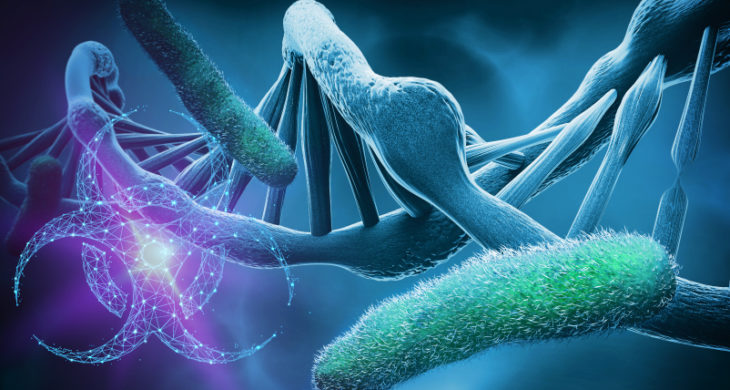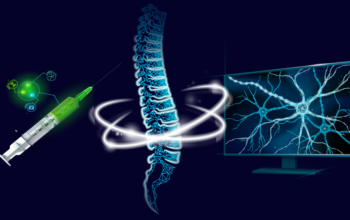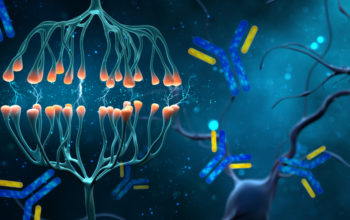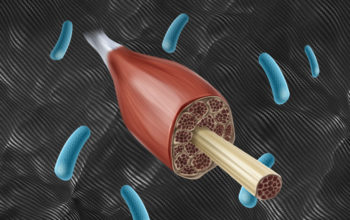
Date: 11th January 2021
Botulism is a rare but potentially fatal illness caused by a toxin produced by the bacterium Clostridium botulinum. As one of the most potent toxins known, the botulinum neurotoxin (BoNT ) blocks neuromuscular transmission, resulting in paralysis and death by asphyxiation. Now, two independent groups of scientists have used nontoxic derivatives of BoNT to deliver therapeutic antibodies against BoNTs in neurons, providing an in vivo delivery therapeutic platform for treating both botulism and other previously inaccessible intraneuronal targets.
Although cases of botulism are low, ~150 cases/year in the US, the BoNTs are classified as one of the top most dangerous potential bioterrorism agents. As there are currently no antidotes and few therapeutic options, once the toxin has been internalised into the neurons, the few treatments available, become ineffective.
BoNTs are a family of bacterial toxins with seven major serotypes – BoNT/A to BoNT/G – with BoNT/A and BoNT/B responsible for most cases of human botulism. That said, these two serotypes are approved for treating a multitude of medical conditions as well as being commercially available for use in the cosmetic industry.
Now, two teams of scientists have independently devised atoxic BoNT-based delivery systems to transport therapeutic single-domain antibodies (nanobodies) into the neuronal cytosol, where they can inhibit BoNT/A toxicity.
The Ichtchenko lab approach
One team, led by Konstantin Ichtchenko, from the New York University Grossman School of Medicine, US, based their delivery system on an engineered low toxicity BoNT mutant. They had previously mutated the BoNT serotype C1 (BoNT/C1) at three points, which eliminated its metalloprotease activity – rendering it atoxic, but retaining the neuronal targeting and intracellular trafficking functions. The team then hypothesised that this mutant could be used to transport therapeutic proteins into the neuronal cytosol.
They designed a precision biotherapeutic consisting of the cargo – a function-blocking single-domain antibody– which they fused to the mutant delivery vehicle. The nanobody, as it is also know, was designed to inhibit the metalloprotease activity of BoNT/A1.
The team then assessed the therapeutic efficacy of the system by administering a post-symptomatic treatment in mice after lethal BoNT/A1 challenge. Whilst the control groups of mice expired within 2 days, the BoNT-nanobody treatment significantly improved 10-day survival to >90%. Furthermore, this treatment expanded therapeutic window compared to antitoxin sera treatments.
The system also efficiently rescued guinea pigs and rhesus macaques after lethal challenge with BoNT/A1, with both models benefiting from multidose treatments.
These data demonstrated therapeutic success of the delivery system in a highly relevant preclinical model of botulism.
The Dong lab approach
The second team, led by Min Dong, from Boston Children’s Hospital, US, used a similar approach using nanobodies against BoNT/A to create a therapeutic protein. However, instead of using a mutated version of BoNT as the delivery system, they developed a chimeric toxin–based delivery platform. They fused the receptor-binding domain of a BoNT, which targets neurons, with the membrane translocation domain and inactivated protease domain of the recently discovered BoNT-like toxin BoNT/X.
Whilst disarming BoNT toxins can still cause muscle paralysis at high doses, the team hoped here, that by using components of a disease-causing form together with a related botulinum toxin that doesn’t naturally invade or disable human nerves – as is the case for BoNT/X – they could create a resulting drug that would have no toxicity.
Indeed, the team showed the chimeric inactive toxin-based delivery platform showed no toxicity in vivo in mice. However, it could both shorten localised BoNT/A-induced leg muscle paralysis and could rescue mice from systemic BoNT/A intoxication. Whilst all of the control infected mice had to be euthanised, all of the group treated at the highest dose had restored mobility/activity within 6 hours.
The team then went on to show that two tandemly fused nanobodies, against BoNT/A and BoNT/B could be delivered into neurons, and could treat both treat both BoNT/A and BoNT/B intoxication in vivo.
Conclusions and future applications
Here, both teams of researchers have shown that atoxic BoNT derivatives can be used to deliver therapeutic antibodies to the neuronal cytosol, where they protect against BoNT toxicity.
As intracellular proteins and processes represent vast untapped drug targets, from a wider perspective both delivery systems offer access to previously inaccessible intraneuronal targets. The ability to target specific cell types, might also advance therapeutic efficacy of other drug cargos thereby, minimising side effects. Both teams have successfully developed protein-based drug delivery platforms that can achieve both highly specific targeting of neurons and successful delivery of therapeutics into the cytosol of cells. By altering the cargo it offers the ability to expanded the application for treating other diseases.
Both teams plan to refine and optimise their systems with an aim to seek approval from the US Food and Drug Administration to commence clinical trials.
Biohijacking is becoming a productive tool for developing drug delivery systems. We have recently seen scientists couple a bacterial injection system with a light-controlled molecular switch, enabling the delivery of cargo proteins into eukaryotic cells, or creating biomimetic drug delivery system derived from macrophage membrane coated ROS (reactive oxygen species)-responsive nanoparticles (NPs) that can treat the disease . Others have used whole cells such as immune cells in attempts to design new treatments for diseases such as cancer.
Whilst these types of therapies are still the early stages of development, the rigorous safety tests needed for clinical translation remain largely incomplete. However, it does appear nature often provides the best solutions. Biohijacking cells, proteins or components of these, offers us a unique opportunity to harness and exploit their biology, creating a novel set of potent therapeutics, able to deliver their cargo into often previously untargetable regions. Using BoNT’s to fight other BoNTs seems a fitting and effective way to fight such a disease, it may also give us some important counter measures against any future, potential bioweapons.
McNutt, P. M., E. J. Vazquez-Cintron, L. Tenezaca, C. A. Ondeck, K. E. Kelly, M. Mangkhalakhili, J. B. Machamer, C. A. Angeles, E. J. Glotfelty, J. Cika, C. H. Benjumea, J. T. Whitfield, P. A. Band, C. B. Shoemaker and K. Ichtchenko (2021). “Neuronal delivery of antibodies has therapeutic effects in animal models of botulism.” Science Translational Medicine 13(575): eabd7789.
https://doi.org/10.1126/scitranslmed.abd7789
Miyashita, S.-I., J. Zhang, S. Zhang, C. B. Shoemaker and M. Dong (2021). “Delivery of single-domain antibodies into neurons using a chimeric toxin–based platform is therapeutic in mouse models of botulism.” Science Translational Medicine 13(575): eaaz4197.
https://doi.org/10.1126/scitranslmed.aaz4197


